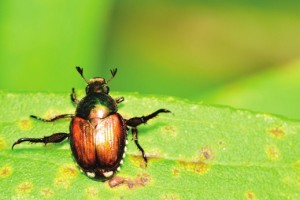Summer heat, bugs bring extra business to area landscapers
If you were in Columbia this June, chances are you experienced the city’s regular 13-year visit from cicadas. They were ugly. They were loud. And there were lots of them — sometimes disturbingly so.
But the truth is, said local plant and pest professionals, cicadas did little to no damage to the area’s terrain. The big bullies this summer were an ever-multiplying body of Japanese beetles and extreme high temperatures that just wouldn’t subside.
“The cicadas certainly got a lot of press earlier this year, but they really didn’t do much damage,” said Anne Crousore, co-owner of Specialty Water Gardens & Landscapes. “It’s the Japanese beetles that have kept us working. They came to Missouri back in 2002, but they’ve become rampant since then.”
Cicadas, as it turned out, did only minor aesthetic damage. When the females laid eggs, they made jagged cuts into the tree branches, which caused small areas to die and turn brown. Japanese beetles, though, left landscape plants defoliated and haggard and created an extra expense for homeowners and businesses.
Crousore recalls one client’s home in particular: “We had put three traps in one yard. I expected to come back in a week and have them be full. They were full the next day; that’s how bad the beetle population has been this summer.”
Specialty Water Gardens’ work crews battle the beetles by using a chemical-free pheromone trap bag. The insects are attracted to the scent, drop into the bag and then can’t get out. The downfall, though, is that the pheromone method sometimes attracts more beetles to an area than might have previously existed. But in certain situations, they are effective, low-risk methods at a relatively low cost to customers.

It’s a long process but a benign and cost-effective solution to the problem, said MU research specialist David Massey. Even when the larvae die, the milky spore remains effective for up to 20 years without threat to other animals or insects.
In conjunction with the insects, said Massey, this summer’s extreme high temperatures have been an additional threat to Columbia’s plant population. It has also created a need for more irrigation, but in areas without water systems, the plants inevitably suffered. Some will survive; some won’t.
“But even that probably wouldn’t impact our cost figures,” Massey said. “There is some cost with replacing plants, but that’s been taken into consideration. And our insect protocol is about the same.
“Overall, even with the heat and the insects, it’s kind of been what we expected for a Missouri summer. Even with replacement costs, we are still in about the right place.”
Still, Massey warns, homeowners and businesses need to be proactive against the beetles. Their population growth has reached new highs in the Columbia area, and that could easily become a costly problem.
Shaun Henry, vice president of grounds maintenance for Atkins Inc., said it’s another pest that’s been causing his customers grief this summer. The Borer beetle and moth larvae, named for their ability to drill holes into tree trunks, have been busy at work putting local species in jeopardy.
Although the Japanese beetle can wreak havoc on a yard, the Borer beetle is more likely to kill a tree over time. The deep burrowing is enough to impair the tree’s vascular system, which makes it difficult and eventually impossible for water to reach all of the branches and leaves or needles.
Atkins has experienced success in treating with an appropriate insecticide on the trunk and root zone. In those plants that are healthy enough, the solution is translocated through the tree and controls the beetles from further attack.
“This summer’s temperatures haven’t helped anything either,” Henry said. “Add in the fact that we had that streak of 100-plus-degree weather late this summer, and that’s hard on a tree. Unfortunately, there are likely several that aren’t going to make it.”


